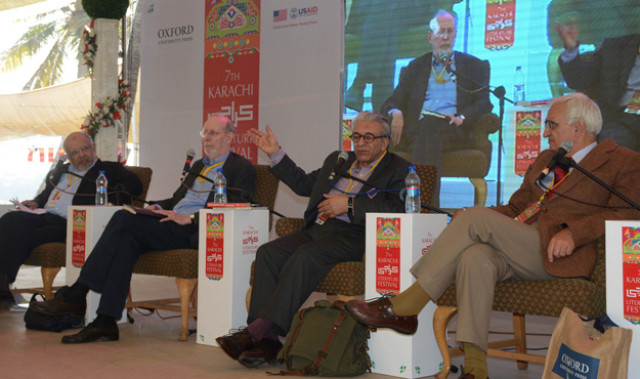Pity the grass when elephants fight, Salman Khurshid on Kashmir
Experts discuss complexities of solving the Kashmir issue, missing voice of locals

Experts discuss complexities of solving the Kashmir issue, missing voice of locals.PHOTO: ONLINE
What will it take to solve the decades-old Kashmir conflict? This and other questions were posed to panellists at the session ‘Kashmir: The never-ending conflict’ at the final day of the seventh Karachi Literature Festival.
Attempting to answer the main query, former Indian foreign minister Salman Khurshid, who graciously filled in for missing panellist Barkha Dutt, said he’s optimistic when he looks at young people in Pakistan and their outlook of the conflict. “Unfortunately, they are also uninformed of the backdrop and complexities of the issue,” he said in the same vein. Khurshid also highlighted the lacklustre response of both Indian and Pakistani leadership, citing the ‘not so promising’ follow-up of the two premiers’ Ufa and Raiwind meetings.
Terming the LoC wall ‘madness’, Kashmiri-origin poet Rafique Kathwari said, “Islamabad says Kashmir is its jugular vein, while New Delhi claims it is an integral part of India. Both countries need to see a shrink!”
When asked to talk about the missing voice of locals, Khurshid said it is a legitimate grievance of Kashmiris that they are not being heard and their input factored in. He explained it best by saying, “The grass gets crushed when elephants fight.”

Criticising the strict visa regime of the two countries later on, Kathwari said, “Let Lollywood come to Bollywood and vice versa.” There should be eight flights a day between the two countries, he suggested. Khurshid agreed that these flights should be sustained even if going in loss.
Chinese connection
Answering a question by journalist Farhan Bokhari, who was moderating the session, French scholar Jean-Luc Racine said the Indian defence policy also has to be understood vis-à-vis China. Talking about China later on, Khurshid said it is ironic that India has no strategic threat from China despite its military and economic clout. “To my knowledge, there have been no casualties on the front with China since the 1962 war,” he claimed, adding that with Pakistan it has unfortunately been the opposite.
Lessons from Ireland
Throughout the session, both the audience and panellists referred to the success of the British-IRA negotiations, and their possible replication with regards to Kashmir. At one point Khurshid said “If Ireland, Berlin and Vietnam can do it [come together after years of conflict], why can’t we?” Answering a question later, he shared that on a recent visit to Ireland he asked them how long it took them to achieve peace. The answer, he said, was “we did it in a hurry…it took 25 years.” He then urged leaders on both sides to acknowledge that peace requires long-term commitment.
Speaking later, Kathwari said economic cooperation brings political cooperation, referring to the Dublin-Belfast highway in Ireland that connected the two warring cities. Sticking to the same subject, he said “We are one,” adding that the economic process between India and Pakistan too needs to move forward.
Adding to the conflict’s comparison with Ireland, Racine said though the situation there was much different, there are lessons that one can adapt.
Replying to an audience member’s question about economic benefits of peace, Khurshid stressed that normalisation of ties would lead to economic growth in both countries. The peace dividend would add to both nations’ GDPs, he claimed. Adding to that, he said “We’ve been fighting this battle for so long we’ve forgotten why we’re in it. We keep going from event to event.”
The discussion was complimented by an Irish audience member when he informed that the mantra during the resolution of the Belfast-London conflict was ‘parity and compassion for all victims’. He suggested that the same needs to be replicated here, on both sides of the LoC, to which the panellists agreed.
Published in The Express Tribune, February 8th, 2016.



















COMMENTS
Comments are moderated and generally will be posted if they are on-topic and not abusive.
For more information, please see our Comments FAQ